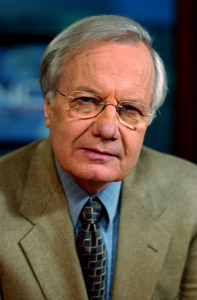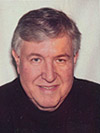| Home | Blog | Ask This | Showcase | Commentary | Comments | About Us | Contributors | Contact Us |

Understanding religious fervor is a key to reporting politicsASK THIS | March 67, 2005Bill Moyers writes in a New York Review essay on political religion: 'The delusional…has come in from the fringe to influence the seats of power.' Also: the NY Times finds debate on global warming among evangelicals. By Barry Sussman Q. Who speaks for the religious fundamentalists where you live? And, looking forward, what are they saying? We posed this question, in the exact same wording, on Nov. 4, 2004, on the grounds that getting the answer to it could explain not only why Bush beat Kerry but also a lot more about politics and 21st century life in America. At the time we cited a post-election column in the New York Times by Gary Wills. Now comes Bill Moyers, a preacher himself, with a longer, deeply instructive piece in the March 24th, 2005, New York Review of Books. Its title is “Welcome to Doomsday.” Moyers starts out describing what he calls “political religion,” by saying: There are times when what we journalists see and intend to write about dispassionately sends a shiver down the spine, shaking us from our neutrality. This has been happening to me frequently of late as one story after another drives home the fact that the delusional is no longer marginal but has come in from the fringe to influence the seats of power. We are witnessing today a coupling of ideology and theology that threatens our ability to meet the growing ecological crisis. Theology asserts propositions that need not be proven true, while ideologues hold stoutly to a world view despite being contradicted by what is generally accepted as reality. The combination can make it impossible for a democracy to fashion real-world solutions to otherwise intractable challenges. Our point in citing the Wills piece in November and Moyers now is that reporters and editors have to understand religious fundamentalism if they are to get politics right these days. Moyers fills in some of the details, saying that for many the invasion of How does this translate to politics? One way is this: Why worry about environmental policy and concerns if Armageddon is close at hand? Moyers cites poll figures showing that true believers in the Moyers also describes a Canadian reporter’s description of a Florida Panhandle church session titled: “Left Behind: A Conference on Biblical Prophecy about End Times.” Moyers used the words "fantasies" and "hatred" to describe some of the conference discussion. Fantasies and hatred to some of us. To others, a credo, and a rationale for voting.
An update, in a different direction A few days after we ran this Moyers item, the New York Times’s Laurie Goodstein reported that a “core group of influential evangelical leaders has put its considerable political power behind a cause that has barely registered on the evangelical agenda, fighting global warming.” “These church leaders, scientists, writers and heads of international aid agencies argue that global warming is an urgent threat, a cause of poverty and a Christian issue because the Bible mandates stewardship of God's creation.” [In articles on consecutive days, Goodstein reported on these views, and on debate over them. Debate? Yes, debate.---Watchdog Project editor]
|




